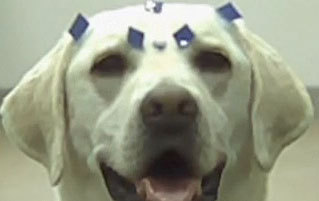5 Stupid Questions You Won't Believe Scientists Answered

One of the best things about Science is that it answers questions we never realized needed answering. In fact, Science gets so overeager sometimes that it starts answering questions that really shouldn't have been asked in the first place. And then sometimes Science gets stuck on those questions and ends up skipping work at the cancer lab or the rocket dome that day because, for reasons it can no longer recall, it is now direly important that it figures out exactly how many licks it really takes to get to the center of a Tootsie Pop.
Is It Possible to Walk Without Spilling Your Coffee?

It doesn't matter if your job involves driving trucks, operating on brains, or ruling the free world -- chances are you still need a dose of caffeine to function in the morning. The problem is that transporting the precious elixir to your workstation, be it a cramped cubicle or a secret laboratory inside a volcano, can be as precarious as walking a tightrope ... while holding scalding liquid.

The flimsy lids are to herd out the weak.
That's why Rouslan Krechetnikov and Hans Mayer, two fluid physicists from the University of California at Santa Barbara, finally said "no more" and pooled their efforts to answer the age-old question: How the hell do you get from the break room to your desk with all of your finger-skin intact?

"This stopped being science long ago, gentlemen ... now we are playing God."
In order to solve this mystery, the researchers employed a rigorous scientific formula called "a bunch of people carrying cups of coffee to places." In each case, they studied the motion of the volunteer's walk, the trajectory of the coffee mug, and spillage from the mug. By analyzing this data, they found that coffee normally spills between the seventh and 10th step and, in the least helpful discovery ever, that trying to change your pace to stabilize the liquid only makes things worse. The logical conclusion is that coffee -- and probably God -- just straight up hates you.

They went on to try different mug designs, but the Coff-Piece never really took off.
The researchers used all this information to devise a number of scientifically tested ways to transport coffee without spilling a single drop. The first technique they suggest is simply to walk slowly -- most people try to walk fast, as if making the trip shorter decreases the chances of spillage, but that doesn't work thanks to the "no doy" principle. The second suggestion is a little more counterintuitive: watch the cup instead of your feet, since this allows you to make small adjustments to correct for sloshes of the liquid. The third suggestion is to get an unusually shaped cup, one with an interior series of rings to suppress sloshing. They got the idea from the way fuel tanks are stabilized inside missiles. So there you go: block your office hallways by walking infuriatingly slowly, focus on the coffee itself while paying absolutely no attention to where you're going, and carry a missile around. You won't waste a single ounce of precious caffeine for all of the 10 minutes before you're fired.
What Are the Chances of Taking a Group Picture Where No One's Blinking?

Quick: Locate a picture of several strangers smiling at the camera in a social situation. Google image search it, or just open up that one weird folder you have where you store all your spy shots of happy families taking portraits. You know, the sad folder named "things I can never have." Open that sucker up: Did someone ruin the photo by blinking at the precise moment it was being taken? Of course they did. That's just one of the two unavoidable realities of life: You will never be loved or happy because you are fundamentally broken inside, and somebody will always blink during a group portrait.

"Blink again, and your next pic will be a coroner's photo."
Photographer Nic Svenson and physicist Piers Barnes set out to figure out why this should be. No, not the whole "you dying alone" thing -- nobody cares about that. They wanted to know why we blink during group photos and how best to avoid it. To begin the experiment, the pair calculated the average number of times people blinked in a minute, which turned out to be 10. Since a blink lasts on average 250 milliseconds and the length of time a camera shutter opens is estimated at eight milliseconds, the probability of a single person ruining a photograph is equal to their expected number of blinks (x) multiplied by the length of time the photographer takes to snap the picture (t).

Apparently someone blinding you with a flashbulb doesn't factor in.
Or, for those of us who slept through math class, it's as simple as this: To calculate the number of shots needed to get a blink-free photo, divide the total number of people in the group by three -- so, if you have 12 people, four snaps should suffice. Unless the lighting is poor: In that case, divide the number of people by two instead, which would leave us at six photos. This is all assuming the group includes fewer than 20 people. If your group photo includes more than that, you're probably loved and respected by your fellow human beings and you have better things to obsess over than blink ratios. You spoiled bastard.
Is Eating Your Boogers Good for You?

University of Saskatchewan biochemistry professor Scott Napper gives a lot of thought to boogers and their consumption, which sounds like something we'd say to ruin his rep with a bunch of second graders. But it's true. And in fact, he posits that there's an important biological reason why children do it. Scott Napper isn't just fooling around here; this is a serious and respected scientific professional.

His research into why none of the other scientists ever invite him to lunch has proven less fruitful.
As Napper tells his students, the mucus in our noses is designed to catch airborne pathogens in the environment. By eating those pathogens, kids could be teaching their bodies what sort of toxic stuff is floating around them, thus preparing and strengthening their immune systems. Napper also points out that the fact that nasal fluids have a sweet, sugary taste could be a sign that they're supposed to be ingested, rather than shunned and confined to trash bins. Napper presumably also points out that you should "stop making fun of him," and that he is not, in fact, "hitting himself" -- you're just moving his hands in such a way that he appears to be hitting himself.

"Today we're going to test my theory that a single photo can keep all us from ever getting laid again."
Does My Dog Love Me?

Dr. Miho Nagasawa has come up with a better way to gauge a dog's emotions than the standard tail wag, and it relies on its face rather than its ass. You might think that dogs have only the one stupid dog expression, but by attaching sensors to the animals' faces, they discovered that there are subtle differences depending on whether your pooch is happy to see you or contemplating pooping in your slippers.

Or happy to see you put on the slippers he's pooped in.
The researchers put the dogs in front of a curtain that they would pull back to reveal either their owner or a stranger. When the owner appeared, the dogs would move their left eyebrow upward, but when it was a stranger, they would pull their left ear back. If it was something they hated, like nail clippers or a vacuum cleaner, the right ear would go back. Tail wagging was largely irrelevant -- dogs are all about the intricate dance of ear position and eyebrows like a bunch of smelly, furry little Groucho Marxes.

He had to set his oversized cigar down for the test.
But, because scientists are more emotionally insecure than a pick-up artist, this still wasn't proof enough for Nagasawa's team. So they carried out yet another experiment, which examined the emotional and biological connection between dog and owner. This one focused on our pee. By analyzing the urine of dog owners after they'd just interacted with their pets, the researchers found that it contained increased levels of oxytocin, also known as the "bonding hormone," because it's what mothers produce to help them form a connection with their newborns. And guess what? Researchers in Sweden found oxytocin in the dogs' systems, too. The feeling is totally mutual. Now just give that damn puppy some space, Nagasawa. Insecurity is not an attractive trait.
Why Do Women Complain About the Cold More?

Researchers at the University of Utah ran a study that largely involved assaulting people with thermometers to prove once and for all that women are colder (and therefore closer to the world of the dead) than men. The surprising result is that they found the opposite -- women are slightly warmer by about 0.3 degrees.
So why aren't men the ones constantly whining about the cold? It turns out that, while women are warmer on average, their hands are much colder than men's. In fact, an average man's hand was found to be 90 degrees, but it was only 87.2 degrees for women.

There. Problem solved. Can we stop arguing about the thermostat now?
That means that women perceive themselves as colder, even when they're not. But even this has little to do with gender and more to do with size and body fat ratio. Studies conducted into human core body temperatures (which involved dunking people in cold water and then shoving a thermometer up their ass, hoping against hope that the victims of their strange fetish would continue believing this was a legitimate science experiment) revealed that men and women with around the same build have pretty much the same core temperature.

Not to mention pretty much the same intolerance for an unexpected thermometer in the butt.
It's just that women, on average, have a higher ratio of heat-retaining body fat but skinnier hands. That's the only way gender comes into the equation. So there you go: Next time your wife complains about the heat, tell her she's got bony hands that are tricking her into feeling cold when really she should be warmer because she's fatter than you. See how that goes down. In the interest of science.
Josh wants to be your BFF on Facebook. When Elorm is not churning out dick jokes for money, you can find him on Facebook talking about soccer and video games. Hossey specializes in amusing you and your friends at his blog here and on Twitter here.
Related Reading: Sometimes the stupidest questions are the most important ones to answer. Like, what happens if you put three people who believe they're Jesus in the same room? Shockingly, there are some dumb questions science just CAN'T answer, like why do we need to sleep? Some scientific studies exist purely to satisfy perverted scientists, cases in point.
And for things that science is clueless about, check out 25 Mind-Blowing Things Science Can't Explain.
